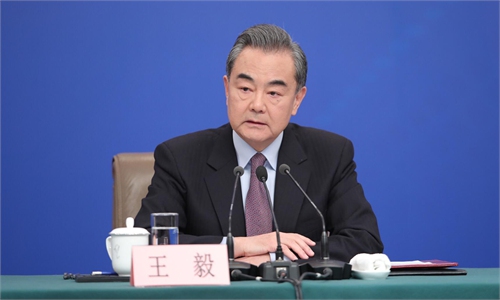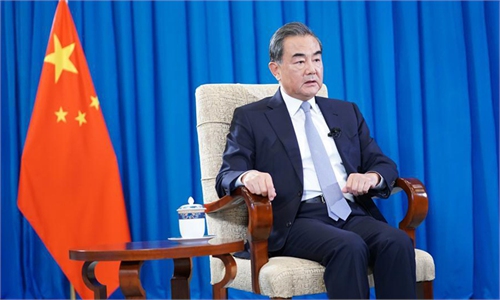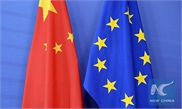Wang Yi kicks off crucial Europe trip
Visit vital for China-Italy ties, expansion of trade: experts
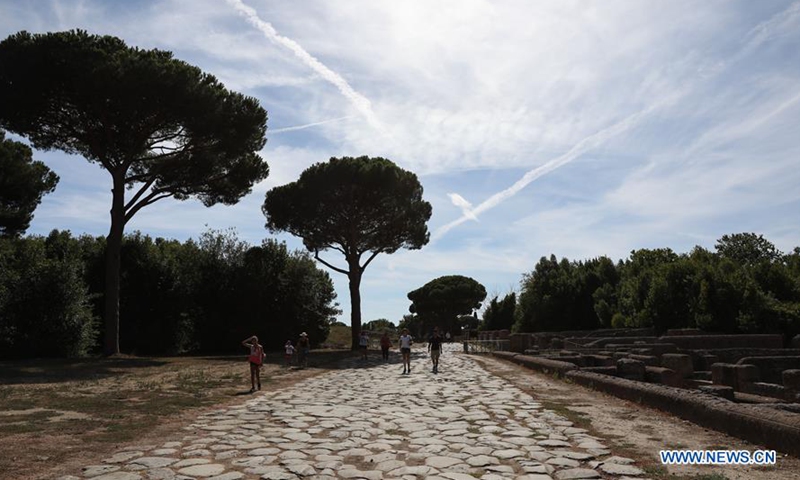
People visit the Archaeological Park of Ostia Antica in Rome, Italy, Aug. 19, 2020. Ostia Antica is a large archaeological site near the modern town of Ostia. The site dates back to the 4th century BC, according to studies. (Xinhua/Cheng Tingting)
Chinese State Councilor Wang Yi kicked off a week-long visit to Europe on Tuesday, his first overseas trip since the start of the COVID-19 pandemic, with Italy as his first stop. Experts said that the high-level exchange will strengthen bilateral political trust and pave the way for 5G cooperation and the Belt and Road Initiative (BRI).
According to the website of the Italian Ministry of Foreign Affairs and International Cooperation, Minister of Foreign Affairs and International Cooperation Luigi Di Maio will meet Wang at Villa Madama on Tuesday, and the two will hold a joint press conference after the meeting.
Analysts said the timely tour could be vital for both China and Italy, especially when the US' unilateralist approach has become a major barrier to the global economic recovery, and amid an intensified US crackdown on Chinese technology firms such as Huawei and TikTok.
The visit of Wang to Italy is very significant and a concrete sign of the importance of relations between China and Italy, Paolo Bazzoni, chairman of the China-Italy Chamber of Commerce (CICC), told the Global Times on Tuesday.
Established in 1991, the CICC had more than 500 members as of 2020, and it is the only business organization representing the Italian business community that is both recognized by the Italian Government and China.
"This visit also marks the 50th anniversary of bilateral relations in a year that saw all forecast events canceled or postponed. The Italian Government and Embassy of Italy in China worked to facilitate and organize this trip at a moment that sees China leading toward a steady recovery," Bazzoni said.
Bilateral trade hit a record high of $54.2 billion in 2018. China is Italy's largest trading partner in Asia, while Italy is China's fifth-largest within the EU, according to a report by the Xinhua News Agency.
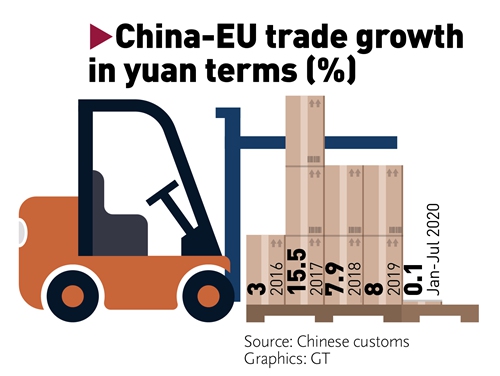
Bazzoni added that even though bilateral trade faced great difficulty during the lockdown, business never stopped this year.
"The discussion is expected to touch on the status of the political relationship between the two countries, and how to improve trade, both imports and exports," Michele Geraci, former undersecretary of the Italian Ministry of Economic Development, told the Global Times on Tuesday.
Issues involving Huawei, which is now a world focus, could be included in the discussions, Ma Jihua, a veteran industry analyst, told the Global Times on Tuesday, noting that the visit may not yield any "immediate result" due to the complexity of the issue.
Previously, media reports said Italy is considering excluding the Chinese tech giant from the construction of its 5G network. In addition, according to Reuters, Telecom Italia has excluded Huawei from a tender for 5G equipment for core networks it is preparing to build in Italy and Brazil.
"From a purely technical point of view, Huawei is superior to other suppliers. This is what my contacts in the telecom industry tell me, with almost no exceptions," Geraci, who is also an economist and former telecom engineer said, adding that this is also empirically confirmed by the current heated debate in Europe. If Nokia or Ericsson were the absolute best, no one in Europe would even consider purchasing Huawei equipment.
The dilemma lies between using a supplier that is very good but comes from a foreign country or choosing something of a lower quality but that belongs to the European family, according to Geraci.
"Then, of course, there are geopolitical issues between the US and China, which the media portrays as national security issues, but it really is a … commercial dispute between a country that is emerging and a country that is losing economic dominance," Geraci noted.
However, although the issue of Huawei may not be settled immediately, Wang's visit, which aims to "control damage" and could be viewed as "pushback" after the US intensified its pressure on European countries over their decisions on Huawei, will no doubt pave the way for the Chinese tech giant's operations in the region, Ma said.
People familiar with the matter told the Global Times that Huawei's commitment in Italy has not altered - it quietly donated medical supplies and electronic devices to support remote medical diagnosis demands during the pandemic.
Cui Hongjian, director of the Department of European Studies at the China Institute of International Studies, told the Global Times on Tuesday that issues such as cooperation under the BRI will also be on the agenda.
"Italy needs China's investment as its economy is yet to recover from the pandemic, particularly in infrastructure and economic exchanges, and the two are set to push forward the hard-won Belt and Road agenda," Cui said.
Italy was the first of the G7 nations to join the China-proposed BRI.
Bazzoni said he expected the visit could enhance the conditions of bilateral trade in areas that could develop much faster, such as Italian mechanical engineering and machinery products, pharmaceutical goods, and quality retail items.
Wang, who is also the foreign minister, will also visit the Netherlands, Norway, France and Germany during his tour. The week-long visit has been welcomed by the relevant countries and demonstrates that both sides attach great importance to China-Europe relations, Zhao Lijian, spokesperson of the Chinese Foreign Ministry, told a regular press briefing on Monday.
